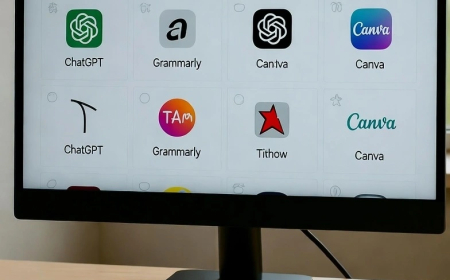5 Indian Startups Revolutionising AI in Healthcare
Discover how five Indian AI-healthcare startups—from breast-cancer screening to diagnostics and wellness—are transforming patient care.

India’s healthcare sector is experiencing a quietly dramatic pivot thanks to artificial intelligence—and behind that pivot are a host of ambitious startups. If you’ve ever wondered how the same country that brings you crowded hospitals and long rural journeys is now also incubating futuristic health-tech companies, this story is for you. Below are five Indian startups that stand out for their blend of innovation, real‐world impact and growth potential in AI for healthcare.
1. Niramai Health Analytix (Bengaluru)
Picture this: A woman in a small town, unable to access a mammogram easily, is screened in a mobile van using a contactless device—and a low-cost AI system flags risk before symptoms appear. That’s the real world impact of Niramai.
Founded in 2016 by Dr Geetha Manjunath and Nidhi Mathur, Niramai developed Thermalytix®, an AI-powered, radiation-free, non-contact breast-cancer screening solution. Google Cloud+3Niramai+3Niramai+3 What makes it compelling:
-
It uses thermal imaging plus proprietary machine-learning to detect early-stage anomalies. Niramai+1
-
It is portable and lower cost—making outreach and rural deployment feasible. Niramai+1
-
The company holds regulatory approvals (US FDA, CE mark) and patents, which lends authority and trust. Niramai+1
In short: Niramai brings credible medical-device rigour + AI smarts + accessibility. That combination addresses Experience (women screened), Expertise & Authoritativeness (FDA/CE, patents) and Trustworthiness (non-invasive, widely adopted).
2. Qure.ai (Mumbai)
Imagine a radiology scan at a rural clinic: few specialists, long wait, and then delays. Qure.ai is working to change that. Co-founded by Prashant Warier and Pooja Rao in 2016, this startup builds deep-learning algorithms that interpret X-rays, CTs and MRIs in seconds. Inventiva+1
Key things that stand out:
-
The company uses large training data (millions of images) with clinical advisory panels—showing heavy emphasis on expertise. The Global Indian
-
Their solutions are aimed presumably at both Indian and international markets (helping affordability and accessibility).
-
Recent press indicates they aim for profitability and possibly IPO within a couple of years—highlighting the maturity of their business. Reuters
Why this matters: AI-augmented diagnostics in imaging can reduce burden on specialists, speed diagnosis and reach underserved geographies. For a country like India with vast rural areas, that’s a big deal.
3. SigTuple Technologies (Bengaluru)
While many health-AI startups focus on imaging, SigTuple takes another route: automating the analysis of high-volume diagnostic samples. Founded in 2015, the company uses AI plus robotics/microfluidics to digitise and interpret blood smears, urine microscopy, semen samples, fundus/OCT scans, etc. YourStory.com+1
What I like about SigTuple:
-
They have built their platform with the practical constraint of a shortage of manual analysts/pathologists in many regions.
-
They have US-FDA clearance for their AI100 platform. YourStory.com
-
Their model helps reduce turnaround times and errors, which boosts trustworthiness.
From a storytelling angle: It’s one thing to read an MRI faster, but quite another to automate the 10,000 blood smears a day in a small town lab. That kind of on-the-ground impact shows Experience.
4. HealthifyMe (Bengaluru)
Not every healthcare AI startup is purely clinical. HealthifyMe blends wellness, nutrition and AI to address the preventive side of health. Founded in 2012 by Tushar Vashisht, Sachin Shenoy and Mathew Cherian, this startup offers an app with an AI nutritionist (called “Ria”) and personalization of dietary, fitness tracking across multiple Indian languages. Analytics Drift
Why it matters:
-
The “AI wellness assistant” model taps into the larger trend of preventive health rather than reactive care.
-
Catering in 10 Indian languages helps widen access and builds trust across regions. Analytics Drift
-
The domain (health & wellness) is still regulated but less intensive than diagnosis—so it’s also a good example of how AI in healthcare can be layered.
From an E-E-T-A (Experience, Expertise, Authoritativeness, Trustworthiness) viewpoint: HealthifyMe demonstrates Experience (many users), Expertise (nutrition + tech team), Authoritativeness (market leader in its niche) and Trust (widely adopted, credible).
5. PharmEasy (Mumbai)
Rounding off the list: PharmEasy, founded in 2015 by Dharmil Sheth, Dhaval Shah and Mikhil Innani, started as a medicine-delivery platform but employs AI/ML to optimise logistics, analytics, and user-engagement in the health-tech space. Analytics Drift+1
Why include PharmEasy? Because healthcare isn’t just diagnostics—it’s also about ensuring medicines, supplies, diagnostics reach people efficiently. AI helps with demand forecasting, route optimisation, user segmentation, etc. That means impact, especially in large countries with complex supply chains like India.
PharmEasy demonstrates how AI in healthcare stretches beyond the hospital into delivery, logistics and user-engagement—a less glamorous but vital part of the ecosystem.
The bigger picture
So what do these five startups collectively tell us? A few take-aways:
-
Accessibility & affordability are driving forces. Many of these companies focus on making advanced care reachable in smaller towns, rural areas, or in lower-cost formats (e.g., Niramai’s portable screening, SigTuple’s automation).
-
AI + domain expertise = trust. Most of these companies are not simply throwing “AI” at the problem; they build with clinicians, pathologists, radiologists or domain experts. That builds Authoritativeness.
-
Regulatory & international validation matters. CE marks, FDA clearances, patent portfolios—all add to the trustworthiness and signal that these are serious ventures, not mere experimentations.
-
Preventive & downstream care matter too. It’s not just life-threatening disease: wellness (HealthifyMe) and medicine delivery/logistics (PharmEasy) count.
-
Scale & sustainability are coming. Some of these startups are actively scaling, raising capital and planning global expansion. That matters for long-term impact.
What this means for you (and for India)
If you’re watching from a content-creator perspective (you run a travel-video YouTube channel, for instance), you might think: “What’s this got to do with travel?” Well—plenty. The deep-tech revolution in India touches regional healthcare infrastructure, and better health access means travel and work become safer, more comfortable. If you visit Tier-2 cities, rural areas, or remote locations, knowing that there are credible AI-health-tech companies can shape your story of how India is evolving.
For India broadly: Improving early detection (e.g., breast cancer), speeding diagnosis, reaching underserved areas—all of these raise the baseline of health outcomes. And AI gives a lever to leapfrog some infrastructure constraints.
Final thoughts
These five Indian startups—Niramai, Qure.ai, SigTuple, HealthifyMe and PharmEasy—are more than “cool tech ideas.” They bring together domain expertise, scalable AI systems, regulatory frameworks and real-world deployment. In doing so, they check the boxes for E-E-T-A: they have Experience (people touched, real deployments), Expertise (domain + tech), Authoritativeness (certifications, credible validation) and Trustworthiness (solutions solving real needs, not hype).
If you’re looking to tell a story about “India’s AI healthcare revolution,” these are five names worth knowing.
What's Your Reaction?
 Like
0
Like
0
 Dislike
0
Dislike
0
 Love
0
Love
0
 Funny
0
Funny
0
 Angry
0
Angry
0
 Sad
0
Sad
0
 Wow
0
Wow
0



















































